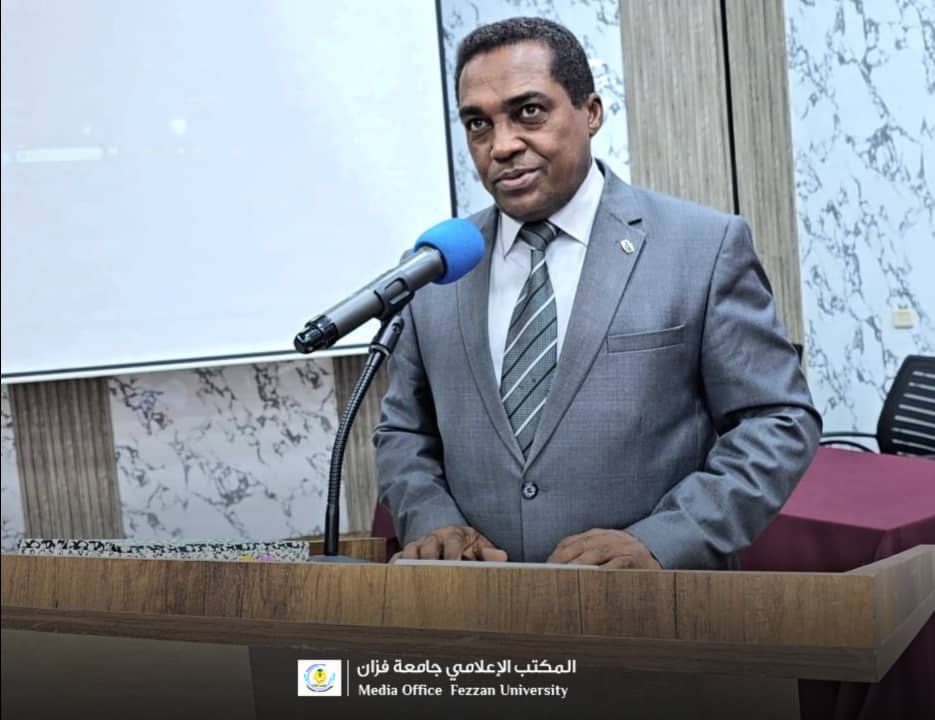
The Speech of the University President at the Scientific Seminar Titled "The Libyan Economic Crisis: Causes and Suggestions for Overcoming the Crisis
Wednesday, April 23, 2025.
In the speech delivered by Prof. Al-Mahdi Milad Al-Jadi, President of the University, during the scientific seminar held in the auditorium of the Faculty of Economics and Accounting in Murzuq this Wednesday, April 23, 2025, he stated the following:
"In the name of Allah, the Most Gracious, the Most Merciful."
- Honorable Director of the Murzuq Security Directorate, esteemed mayors of the municipalities, honorable Director of the Murzuq Basin Office, honorable Director of the Administrative Control Authority, Murzuq Branch, honorable Director of the Audit Bureau, Murzuq Branch, honorable Vice President of the University for Academic Affairs, esteemed deans of faculties and their deputies, honorable General Secretary, General Registrar, and directors of departments and offices, esteemed faculty members and participating guests, each by their name, title, and position, our dear students.
Peace be upon you and the mercy of Allah and His blessings. May Allah bless your morning.
It is my pleasure and honor, on behalf of Fezzan University, its administration, faculty, and students, to welcome you all to the opening of the scientific seminar titled "The Libyan Economic Crisis: Causes and Suggestions for Overcoming the Crisis," organized by Fezzan University, represented by the Faculty of Economics and Accounting. It is indeed a source of joy that this seminar is being held in the city of Murzuq, an ancient city with deep historical roots, which was the capital of the Fezzan region until recently and has contributed to shaping the Libyan national identity.
● The city has gone through difficult circumstances and painful events that led to the disruption and closure of most educational, health, and service institutions, including this college. However, thanks to God Almighty and the sincere and dedicated efforts of the General Command of the Armed Forces, along with the wise and prudent management of the Development and Reconstruction Fund of Libya, we are now living in a state of security, safety, development, and reconstruction, which is a tangible reality throughout the city. We also commend the prominent role of the Director of the Murzuq Security Directorate, who significantly contributed to establishing security within the city, positively impacting the provision of a suitable environment for holding this seminar. Additionally, we appreciate the tireless efforts of the Mayor and members of the Murzuq Municipal Council in fostering unity, reconciliation, peaceful coexistence, and activating public and private institutions within the city.
● Ladies and gentlemen, the convening of this seminar today is not merely an academic activity, but a step towards the university assuming its national and scientific responsibilities in contributing to addressing one of the most serious crises facing our beloved country, namely the economic crisis that affects all aspects of life for the Libyan citizen and threatens the foundations of society and the nation.
● The Libyan Economy has faced severe disturbances for over a decade due to political and security transformations that have directly impacted the performance of financial institutions and various vital sectors. The complexity of the situation has been exacerbated by the absence of a unified economic strategy, duality in financial decision-making, and overlapping authorities. Additionally, the economy is almost entirely reliant on the oil sector, which is also suffering from global price fluctuations and local conflicts over revenues and distribution. One manifestation of this crisis is the exchange rate of the dinar against foreign currencies. Since the decision to adjust the exchange rate in 2021 and the subsequent decisions that followed, along with the decline in the dinar's value against foreign currencies, we have witnessed wide-ranging repercussions on the prices of goods and services and on the purchasing power of citizens. Contributing factors to this crisis include the near-total reliance on imports to secure basic needs, a clear weakness in domestic production, and excessive demand for foreign currency due to a lack of confidence in the national currency. Furthermore, the absence of transparency and governance in managing the state's foreign currency reserves, along with corruption, smuggling, and the parallel economy, deplete resources and weaken the state's tools to control monetary policies.
● Ladies and gentlemen, we believe at Fezzan University that the university is not merely an educational institution, but a center of expertise, a platform for dialogue, and a hub for strategic thinking that can significantly contribute to the formulation of alternative policies and propose economic solutions capable of addressing the challenges of our time. Therefore, I call upon you to support research and study centers both within and outside universities, to open direct communication channels between decision-makers and researchers, and to involve colleges and research centers in the formulation of public policies, especially in vital areas.
● Finally, I would like to extend my sincere gratitude to everyone who contributed to the organization of this seminar, including professors, students, and staff, as well as to all the esteemed guests and experts who responded to our invitation and contributed their ideas to this national scientific effort. Thank you all for your appreciation and gratitude.
● Peace be upon you and the mercy of Allah and His blessings.
1 - Prof. Al-Mahdi Milad Al-Jadi, President of Fezzan University.
(Media Office of Fezzan University).
